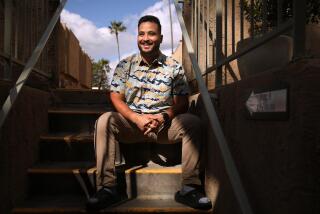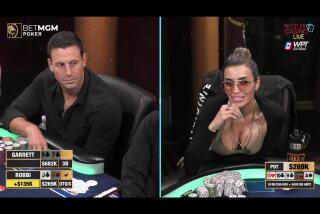Net Results: Ivan (Big Check) Lendl, Pat (No) Cash
- Share via
WEST PALM BEACH, Fla. — The scoreboard showed the final totals:
Ivan Lendl: $583,200
Stefan Edberg: $234,800
John McEnroe: $182,000
Pat Cash: $0
“I guess we can’t give him the runnersup check,” said Arthur Ashe, who was standing on the court for the award ceremony. “What was it for?”
Ashe turned around to look at the scoreboard.
“It’s for zero,” he said. “Maybe that’s why he’s not here. It’s your basic blank check.”
And that’s how Pat (No) Cash will be remembered by the national television audience and the crowd at The Stakes Match here at the Palm Beach Polo and Country Club on Sunday.
Lendl won the tennis match, three games to one, in this made-for-television venture. He dropped the first game before sweeping the next three.
Cash, at one time, had accumulated $315,800 after he won the opening game from Lendl. But he proceeded to lose the entire sum in a little less than two hours. Afterward, Cash fled the court, having lost $350,600 in the last two days, including $250,600 to Lendl in Sunday’s final.
He had led after the first day of competition on Friday with the $350,600 total, and carried the $250,600 sum into the final.
Additionally, Cash also failed to show for his press conference afterward, which, considering the way he acted on Saturday after reaching the final, was probably a good thing. He departed the grounds without a word to anyone, except to Lendl.
“He said I should buy him dinner in New York,” said Lendl.
Lendl laughed. It wasn’t hard to do after pulling off the biggest payday of his career, and of the career of any tennis player ever. In comparison, Lendl won $250,000 for taking the U.S. Open in September.
“It’s unbelievable,” he said. “I don’t really have words for it . . . I feel a little bit sorry for Pat because he played his heart out and ended up with zero.”
Cash had said before the final that he didn’t care if he lost all of his money, just as long as he played well. But judging from the way he acted, Cash apparently cared more than he expected to Sunday. Lendl doubted the honesty of the statement, too.
“I don’t think he was happy,” Lendl said. “I thought he played reasonably well. I have a hard time believing anyone who says six hundred grand doesn’t mean anything.”
Chuck Fairbanks, the former football coach who is one of the three partners in The Stakes Match and devised the format, agreed with Lendl’s assessment.
“We invited four guys here to play for a million dollars,” Fairbanks said. “They knew there would be a great reward if they won. And if they lost, they might need bus fare to get home.
“I don’t blame Pat for leaving like that. Hell, no. He was hot. He’s a competitor and he lost everything. I’ve lost games and I didn’t want to talk to anyone, either. I’ve been there before. I’m sure he was a little red-faced. I hope if he’s invited again, he comes back.”
What did Cash in--dropping him behind McEnroe and Edberg--was the escalated stakes for the final. Each player received a $250,000 stake before entering the first day of round-robin competition. In retrospect, both Edberg and McEnroe seemed pleased they were taking home such large amounts after losing out on reaching the final, as opposed to taking the chance of losing it all to the No. 1-ranked Lendl.
During round-robin play the first two days, each game was worth $30,000, rally points worth $200, and aces and double faults worth $2,000. For the best-of-five game final, the first game was worth $30,000, the next $60,000, and so on. The first player to reach 21 points, by a margin of two, would win the game. And the rally points were increased to $400, and doublefaults and aces were $4,000. So, if Cash and Lendl had a three-stroke rally won by Lendl, Lendl would win $1,200.
Here is how Cash started out with $250,600, and ended up with Less Than Zero:
--He beat Lendl in the first game, 21-11, and won $65,200, which included the $30,000 for the game and $35,200 for the rally total. This increased his earnings to $315,800.
--Cash lost the next game, 21-18, and dropped $56,000. Since it was the second game, it was worth $60,000, but Cash came out ahead on rally points, so he lost just $56,000. Cash’s stake fell to $259,800.
--In the third game, Cash lost, 21-7, which was worth $90,000. Lendl also won big on the rally points, taking $33,600 for a total of $123,600. Cash had $136,200 heading into the fourth game, already putting him behind Edberg and McEnroe.
--Cash fell 22-20 in the fourth game as Lendl hit a volley to take the match and the rest of Cash’s money. For the game, Lendl won $120,000 and $17,200 in rally money. This left Cash with less than zero--actually, $1,000 less--but he doesn’t owe Lendl the money because the game rules say a player isn’t allowed to use his own money.
“The match was over, but thinking about it, I don’t think he paid me up in full for the last set,” Lendl said, laughing. “I don’t think he had enough money left to pay me up in full. I think he owes me $1,800.”
Certainly, Lendl would probably be risking bodily harm if he were to ask Cash for the difference when they get to New York for the Masters this week.
Even on his biggest payday ever, Lendl still realized there is more to tennis than money. Despite winning all of Cash’s money and despite winning one of the largest check any athlete has received outside of a boxing ring or some golf course in South Africa, Lendl still wants something Cash already has.
“I’d rather walk away from here with nothing,” Lendl said, “and have won Wimbledon.”
More to Read
Go beyond the scoreboard
Get the latest on L.A.'s teams in the daily Sports Report newsletter.
You may occasionally receive promotional content from the Los Angeles Times.











